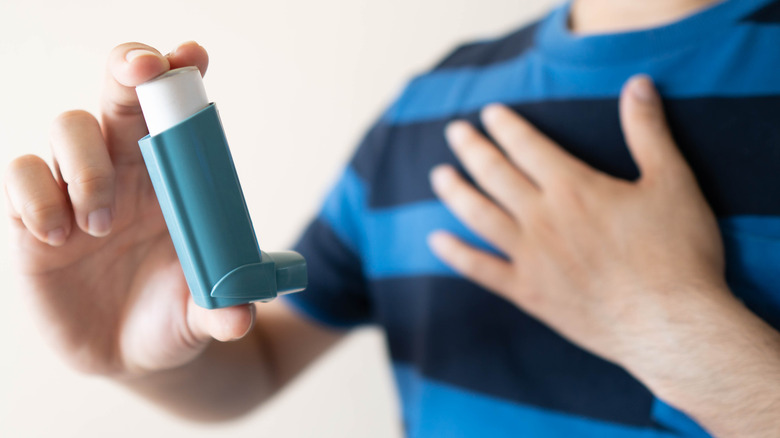What Happens To Your Body During An Asthma Attack?
Asthma is a chronic disease that makes it difficult to breathe (via American Lung Association). It is a common ailment — more than 26 million Americans have asthma. Of those, more than 6 million are children. There is no cure for asthma, and at times, it can be serious, as it is the third leading cause of hospitalization among children. If not treated, asthma can be life-threatening (via Cleveland Clinic).
When a person is having an asthma attack, their airways are swollen and inflamed (via Mayo Clinic). The airways produce mucus as the muscles around contract and the breathing tubes narrow. During an asthma attack, you may experience coughing, wheezing, chest tightness or pain, and severe shortness of breath. Symptoms of asthma vary from person to person, so you may not experience all these symptoms at once, or you may get different symptoms from one attack to another. Your doctor will help you recognize the signs of an asthma attack and inform you how to treat them.
What to do when you get an asthma attack
If you're experiencing an asthma attack, immediately follow the treatment plan your doctor has given you. This typically means using a quick-acting inhaler which delivers airway-expanding medication to your lungs (via Mayo Clinic). Young children and people who have issues with inhalers may be told to use nebulizers. Repeat the treatment after 20 minutes if necessary. If symptoms do not improve, see your doctor or go to urgent care that day.
If you're having trouble speaking because you're so short of breath, you may be having a severe asthma attack. Use your rescue inhaler and seek medical care right away. If an asthma attack is treated in an emergency room, doctors can administer a number of medications to ease symptoms. In severe cases that are life-threatening, intubation may be needed. This is when a breathing tube is inserted through the throat into the upper airways so oxygen can be pumped into the lungs while medication is administered.


